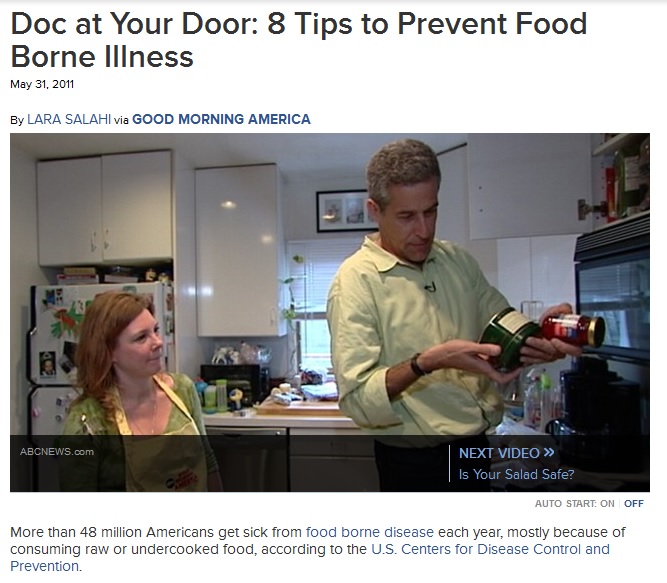It’s important that you observe safe handling of food, especially raw meat, as soon as you take them home or to your place of business. Raw foods contain bacteria, and if not isolated from other foods—fruits and vegetables, for instance—they will contaminate them, as well. Contamination also occurs when you leave food out at room temperature for more than two hours.

Below is an excerpt from an ABCNews article which offers helpful tips on preventing food borne illness:
“Don’t leave foods that need to be chilled sitting out. Refrigerate and freeze necessary foods right away.
Do use a meat thermometer to make sure your food is cooked thoroughly.
Do wash your hands for at least 20 seconds with warm, soapy water before and after handling any raw meats, fruits and vegetables.
Do wash utensils and disinfect surfaces before and after use.
Don’t defrost food on the kitchen counter. Instead, use the refrigerator, cold running water, or the microwave oven.
Don’t let food marinate at room temperature.
Keep marinating food refrigerated.
Don’t over pack the refrigerator.”
Common culprits
Bacteria, parasites, and viruses trigger food contamination
Educate yourself
Improve your company’s knowledge on safe food handling practices by taking food safety courses, such as those offered by Safe Food Training. Professional food preparation is a big responsibility. The last thing you want to do is get you customers sick or die because of poor food handling in your kitchen! Remember that foodborne illness can be traced to your placeand can destroy your restaurant’s reputationor even worse, can cause permanent closure of your establishment. Obtaining food manager certification in MN, and following the food handling procedures outlined in the course is a great insurance policy against these potential risks.
ServSafe in MN—ServSafe, being a food and beverage safety training and certificate program administered by the National Restaurant Association—helps keep managers updated on food safety and provides them the learning resources to train their employees in turn. Training includes how to trace contamination, and how to prevent it, as well as the components of personal hygiene in the food and beverage business.
(Source: Doc at Your Door: 8 Tips to Prevent Food Borne Illness, ABCNews.go.com, May 31, 2011)


